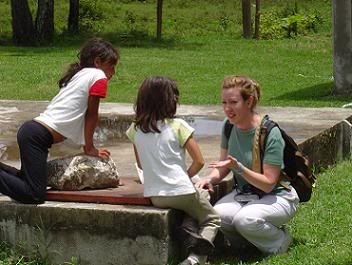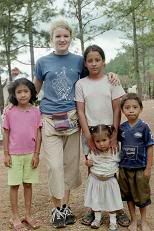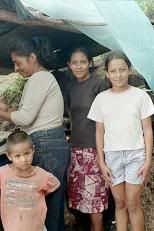Reflections from Honduras J

Jesus said, "Let the little children come to me, and do not hinder them, for the kingdom of heaven belongs to such as these."
Going to a third world country such as Honduras would make a huge impact on anyone, especially coming from our culture, so it is hard for me to tell you how it has changed my life except to tell you a story of how one small girl helped me to see how God is truly working all over the world.

Soveta and her family and Melanie
Her name is Soveta, an eleven-year-old girl I met in a small community called Via Oriental up on a mountainside outside of

With my limited Spanish, I was able to ask her name, how old she is, how many siblings she had, how long she had lived there and other basic information that you would want to know about someone you just met. When I asked her about her family and where she lives, she pointed way down the mountain, took my hand and led me along the dirt road and down a steep incline that most of us would have trouble navigating day in and day out, but these children are like little Billy goats in their torn shoes and bare feet running up and down the slopes as if they were on level ground. The first time I went to her home, my daughter Melanie was with me, so we followed Soveta until we wound our way down to her house. Her house was what we would call a shed or shack, wooden planks with a tin roof and no bigger than a very small bedroom here in the States. Their kitchen, if you could call it that, was just outside the house with a piece of plastic over a “lean to” so they could cook in the rain. There were clothes hanging on a line that had been rinsed in a rain barrel. Soveta introduced me to her mother, Marta, who was preparing tortillas over an open fire, and then to her siblings, cousins, and aunt. She pointed to the door of the house and said “abuela”. I poked my head inside and saw a small feeble little woman sitting back in the darkness on a tattered and dirty mattress and realized that she was Soveta’s grandmother. Later I saw this feeble little woman climbing up and down the mountain just like one of the children! At this point, I just had to know how many people lived in this one-roomed shack, and when Soveta said “quince” (15), I thought she must have said “cinco” (5), so I asked her again. Again, she said “quince”, and I was in disbelief, but realized this was how most of the people here lived, beyond our comprehension.
At the end of the day, I wasn’t sure we were coming back to this community, so I felt sad that I would never see this little girl again, so I hugged her very tight and told her as I had been telling her and her friends all day, “Christo te ama” (Jesus Loves You) and “Dios te bendiga” (God bless you). These were the only words I knew to tell her about God and Christ, but what I didn’t realize at the time was that God was showing this little girl and me His love that transcends all culture and language barriers.
That evening, when we were told that we would be going to Via Oriental again the next day, I was thrilled that I would get to see the children that I had gotten to know in such a short time and especially Soveta and her little friend Louta. So I pulled out as many things as I could from my stash of snacks and items from my suitcase and was able to fill two bags full of goodies for her and her friend. These people are so grateful to get the simplest of things. Treasures to them would be items we would put in our garbage cans to dispose of. Things that we would put in a yard sale would be the greatest of riches to them!
As our bus approached Via Oriental, I prayed that I would find Soveta again, and my worries soon vanished as we pulled into the community, and all the little children came running. It wasn’t long before she heard we were back, and I was amazed how quickly she was able to climb the mountain and down the dirt road to greet us once again. This day, we were only in the community long enough to distribute the food to the other half of the families that we missed the first time. It made me very happy to see how excited Soveta was about the bag of clothes and treats I had brought to her, but I was even more touched when she didn’t even open it up and take out things for herself, she took my hand and led me back to her house and gave it to her mother so the whole family could share in this gift. This time, my husband, Derrel had gone with me to her house, and we gave them two bags of food since there were so many in their family in such a small place.
Then I knew it was time to part once again, and my heart was heavy, knowing I would probably never see her again in this lifetime, and even wishing selfishly that I could take her back home with me, spoil and pamper her with everything her heart would desire. So God, in his goodness, was able to comfort me and give me peace about leaving this little girl and her community in such a beautiful way. On our way back to the bus, Soveta led me down a different path, and she stopped at pointed at a small open shed with some small chairs all lined up inside and colorful flags displayed on the ceiling. She said “Iglesia” which means church. Soveta and I could not communicate well, but in her sweet way, she was telling me that God was already in this community and that she understood why I was there, and with this one spoken word “Iglesia”, my hand in hers and one more hug before we parted, I felt that God instantly gave me peace about this little girl, her family and friends, that he is truly everywhere in the world loving and caring for his people. Other Christians had already been in this little community working to spread his love and even build a small church, so I knew that I had been another instrument used by God to continue to communicate His love in what I thought was a very limited way to this little Honduran girl but what turned out to be a major unexpected blessing my life and I hope for hers as well.
I learned never to minimize what God can do through me even if I feel overwhelmed that I can’t really make much of a difference in the vast needs that people have, whether it be physical or spiritual. Even if my efforts affect one small life, it is BIG in God’s eyes. I pray that the love that this little girl and I shared for just a brief span of time in our lives will continue to grow in our hearts and we will both make a difference in each and every person’s life that we come in contact with.
No comments:
Post a Comment